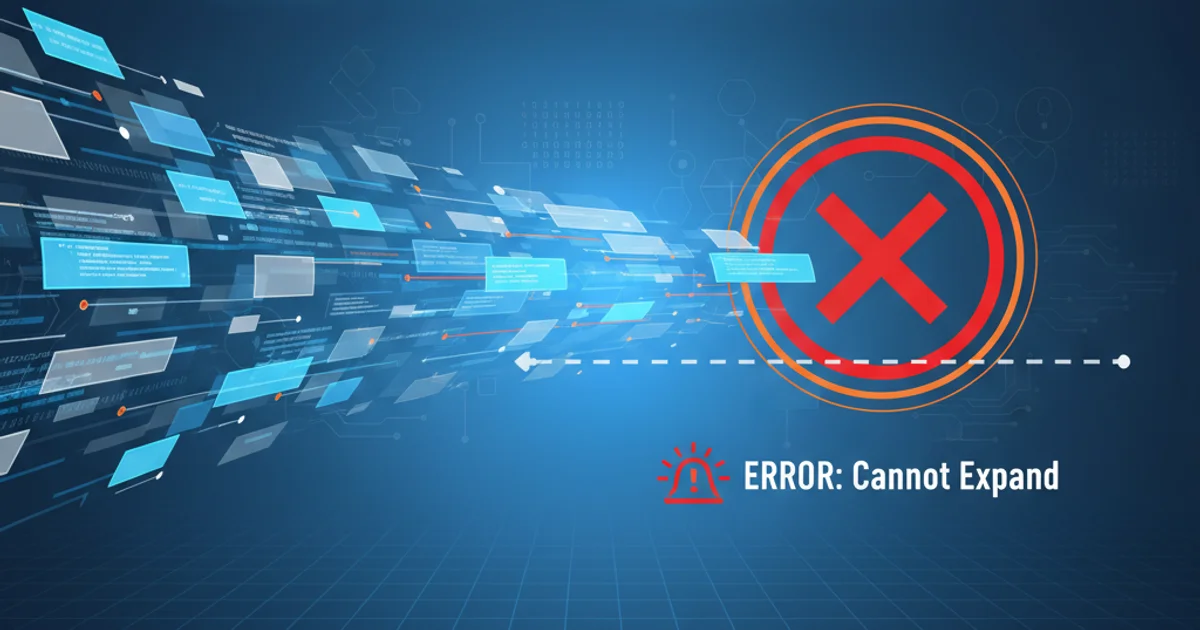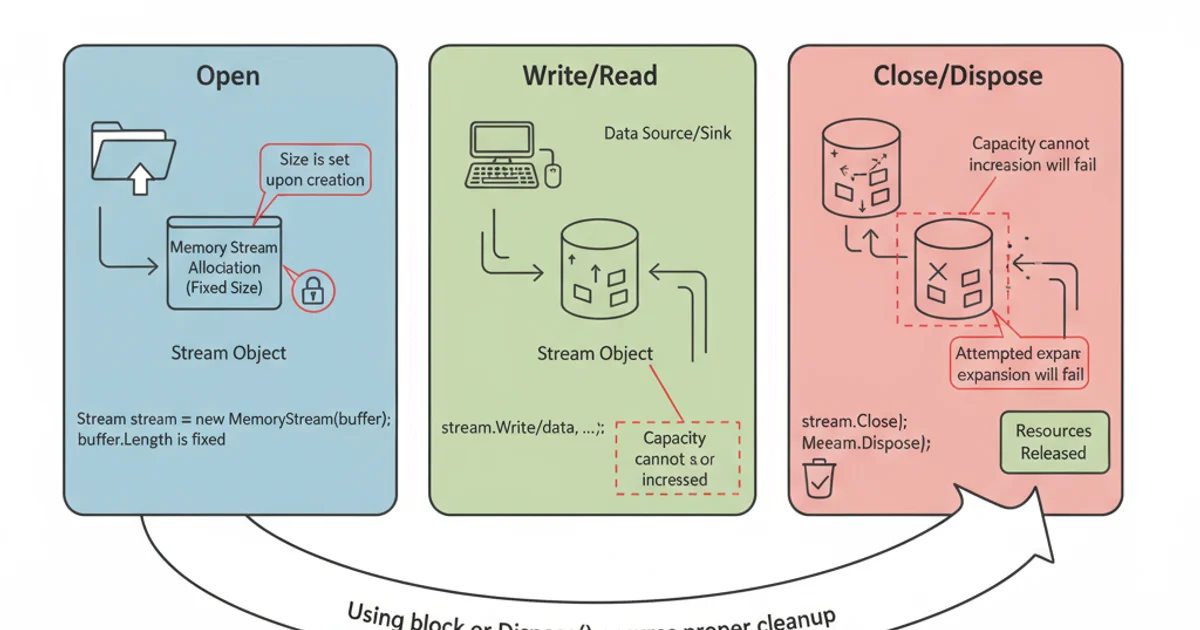Memory stream is not expandable
Categories:
Resolving 'Memory Stream is Not Expandable' Errors in C# Email Attachments

Understand why MemoryStream might throw an 'expandable' error when handling email attachments in C# and learn robust solutions to ensure your streams are correctly managed.
When working with email attachments in C#, developers often encounter the error message "Memory stream is not expandable." This typically occurs when attempting to write to a MemoryStream that was initialized with a fixed-size buffer or when the underlying stream's CanWrite property is false. This article will delve into the common causes of this issue and provide practical solutions to ensure your email attachments are handled correctly.
Understanding the 'Not Expandable' Error
The MemoryStream class in C# provides a stream whose backing store is memory. It's highly versatile for in-memory data manipulation. However, its behavior regarding expandability depends on how it's constructed. If you initialize a MemoryStream with a byte array using new MemoryStream(byte[] buffer), the stream is created with a fixed capacity equal to the length of the buffer. In this scenario, attempts to write beyond the initial capacity will result in the "Memory stream is not expandable" exception because the stream cannot dynamically resize its internal buffer.
flowchart TD
A[Start]
B{MemoryStream Initialization?}
C[new MemoryStream()]
D[new MemoryStream(byte[] buffer)]
E{Attempt to Write Beyond Capacity?}
F[Stream is Expandable]
G[Stream is Fixed-Size]
H[Write Successful]
I["Memory stream is not expandable" Error]
A --> B
B -->|No arguments| C
B -->|With byte array| D
C --> F
D --> G
F --> E
G --> E
E -->|No| H
E -->|Yes| IDecision flow for MemoryStream expandability
Common Scenarios and Solutions
This error frequently arises when you're trying to populate an attachment's content from an existing byte array, but then attempt to write additional data to the same MemoryStream instance. The key is to ensure that the MemoryStream used for writing is initialized in an expandable manner or that you're not attempting to write to a stream that's already been finalized or closed.
MemoryStream without a predefined buffer if you intend to write data to it dynamically. Use new MemoryStream() for an expandable stream.Solution 1: Initialize an Expandable MemoryStream
The simplest and most common solution is to initialize your MemoryStream without providing an initial byte array. This creates a stream with an initial capacity of zero that automatically expands as you write to it. You can then write your attachment data into this stream.
using System.IO;
using System.Net.Mail;
public class EmailService
{
public void SendEmailWithAttachment(string recipient, string subject, string body, byte[] attachmentBytes, string attachmentFileName)
{
using (MailMessage mail = new MailMessage())
{
mail.To.Add(recipient);
mail.Subject = subject;
mail.Body = body;
mail.IsBodyHtml = true;
// Solution: Initialize an expandable MemoryStream
using (MemoryStream ms = new MemoryStream())
{
ms.Write(attachmentBytes, 0, attachmentBytes.Length);
ms.Position = 0; // Reset position for reading
Attachment attachment = new Attachment(ms, attachmentFileName);
mail.Attachments.Add(attachment);
// SmtpClient setup and sending logic here
// using (SmtpClient smtp = new SmtpClient("your.smtp.host"))
// {
// smtp.Send(mail);
// }
}
}
}
}
Using an expandable MemoryStream for email attachments.
Solution 2: Create a New MemoryStream for Reading
If you already have a byte[] that represents your attachment content, and you're passing it around, you can directly create a new MemoryStream from this byte array specifically for the Attachment constructor. This MemoryStream will be fixed-size, but since the Attachment class only reads from it, it won't attempt to expand.
using System.IO;
using System.Net.Mail;
public class EmailService
{
public void SendEmailWithAttachmentFromBytes(string recipient, string subject, string body, byte[] attachmentBytes, string attachmentFileName)
{
using (MailMessage mail = new MailMessage())
{
mail.To.Add(recipient);
mail.Subject = subject;
mail.Body = body;
mail.IsBodyHtml = true;
// Solution: Create a new fixed-size MemoryStream for the Attachment constructor
// This stream is read-only for the Attachment, so expandability is not an issue.
using (MemoryStream ms = new MemoryStream(attachmentBytes))
{
Attachment attachment = new Attachment(ms, attachmentFileName);
mail.Attachments.Add(attachment);
// SmtpClient setup and sending logic here
// using (SmtpClient smtp = new SmtpClient("your.smtp.host"))
// {
// smtp.Send(mail);
// }
}
}
}
}
Creating a fixed-size MemoryStream directly from bytes for attachment.
MemoryStream to the Attachment constructor, the Attachment object will take ownership and dispose of the stream when the MailMessage is disposed. Do not try to reuse or write to the stream after it's been assigned to an Attachment.Best Practices for Stream Handling
Proper stream management is crucial to prevent resource leaks and unexpected errors. Always use using statements with MemoryStream and other stream types to ensure they are correctly disposed of, even if exceptions occur. When dealing with email attachments, ensure that the stream provided to the Attachment constructor remains open and accessible until the email has been successfully sent.

The lifecycle of a stream: open, use, and dispose.